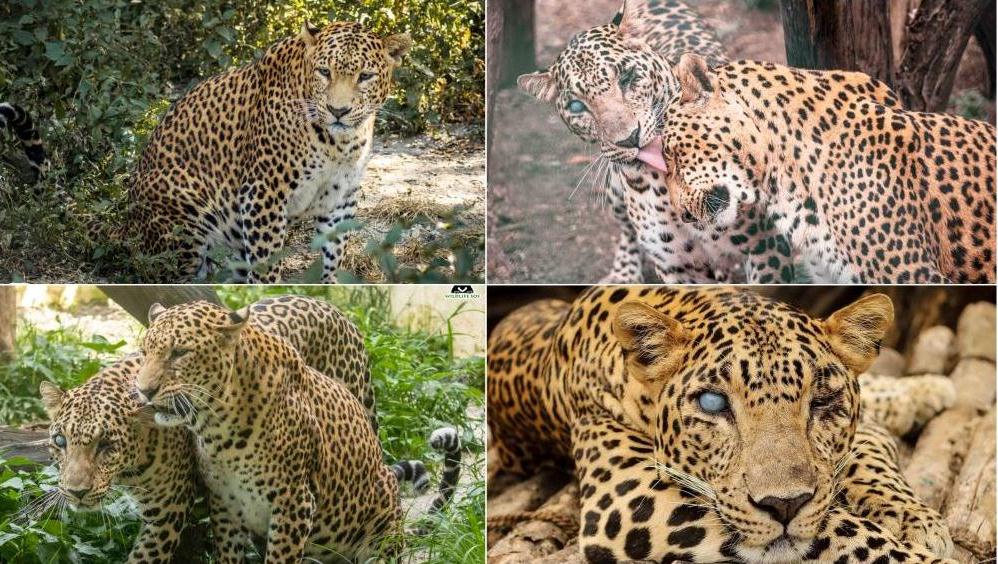Pune: Two Rescued Leopards Share Uncommon Friendship

Pune, 16th September 2022: Big cats have long been creatures of mystery and are quite awe-inspiring. In India, two such marvellous male leopards —GANESH and VITTHAL have struck up a rare friendship.
The duo was rescued by conservation charity Wildlife SOS and is currently residing at the Manikdoh Leopard Rescue Centre, located in the western state of Maharashtra.
In 2011, India-based conservation charity Wildlife SOS rescued Ganesh, a male leopard, from a severe human-animal conflict scenario. Having been brutally attacked by a hostile mob, this young leopard was grievously injured and left battling for his life. Ganesh was rushed to the Manikdoh Rescue Centre, run jointly with the Maharashtra State Forest Department, for urgent medical treatment. With little time in hand, Ganesh had to be operated on for a severely infected left eye. He had also developed a cataract in his right thereby permanently impairing his vision.
Vitthal’s story, on the other hand, involves the leopard being an oblivious victim of a deadly snare trap set up by poachers. Rescued by Wildlife SOS in 2009 from a small village skirting the borders of a dense forest in Maharashtra, Vitthal was gravely wounded by the wire snare trap. The NGO’s veterinary team toiled hard to save the animal’s life and though Vitthal survived the ordeal, it led to the unfortunate and permanent loss of his right hind paw.
In the case of both leopards, life in the wild was no longer possible and so they were placed under the long-term care of Wildlife SOS. Having experienced trauma in the past, the Wildlife SOS team decided to introduce the two leopards to observe their interaction. It was heartwarming to see the two male leopards strike up an unlikely friendship and grow inseparable after having spent over a decade in each other’s company.
Today, the leopard BFFs can be spotted walking in their spacious field and playing with enrichments. Keeping their comfort in mind, Ganesh and Vitthal’s caregivers have created special enrichments for them. The climbing platforms are designed at a convenient height and are big enough to accommodate them both. They are also provided with olfactory enrichments (strong aromas – like basil, flowers, leaves etc ) which create curiosity and excitement. When they are not busy playing, the duo engage in long grooming sessions. Grooming not only serves as a way for big cats to keep clean but it also plays an important social role. All cats, big or small, will groom each other in a gesture of trust, affection or protection.
Kartick Satyanarayan, Co-founder and CEO, Wildlife SOS said, “Ganesh and Vitthal are a rare example of a deep bond between two adult males. In the wild, two male leopards will not bond with each other due to their natural tendency of being territorial. While Ganesh relies heavily on his auditory and olfactory senses to compensate for his vision, Vitthal can be seen climbing his platform enrichments which are built specially to suit his needs.”
Geeta Seshamani, Co-founder & Secretary Wildlife SOS said, “Caring for rehabilitated leopards is a herculean task – geriatric leopards like Ganesh and Vitthal, who also have physical disabilities, require more care than others. Keeping them motivated with food-based enrichment to stimulate and exercise their limbs is a good way to keep them active.”
Ganesh and Vitthal also perform an important role as conservation ambassadors to sensitise people about the threats that leopards face in India.
The state of Maharashtra has seen a dramatic increase in human-animal conflicts, predominantly problems relating to leopards that have ventured into sugarcane fields and human habitation. Unfortunately, this is a direct consequence of rapid human encroachment into forested areas surrounding villages and crop fields. Leopards appearing in human habitations often stir panic because of the feline’s nature of being a predator. For years, Wildlife SOS has been assisting the Forest Department in rescuing leopards trapped in open wells, caught in conflict situations, injured in highway accidents or by hunting devices, and even reuniting leopard cubs that have been separated from their mothers. Timely arrival allows a potential leopard-human conflict scenario such as retaliatory attacks to be avoided and educating the local communities on not harming these big cats.






